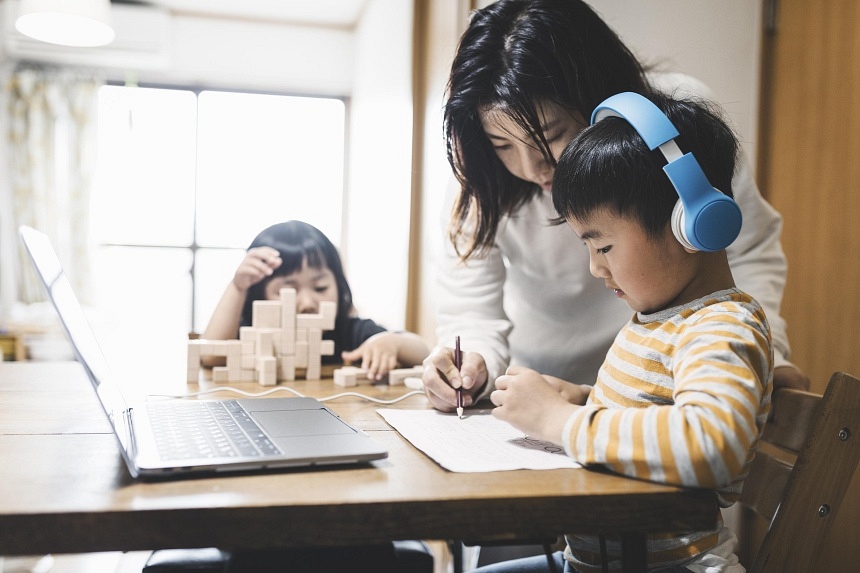As technology takes over education, should we be worried?
If introduced without due thought, edtech can increase stresses in families, as China’s experience shows.

South Korea’s plans to introduce the world’s first AI-powered, tablet-based digital textbooks in 2025 have been mired in a firestorm of debate about potential privacy issues and worries that students are becoming overly dependent on digital devices. Despite these concerns, the country’s Education Minister Lee Ju-ho doubled down on the importance of transitioning classrooms to digital modes of learning while assuring teachers that they will be fully supported as they integrate artificial intelligence (AI) textbooks into their instruction.
The introduction of digital tools and infrastructure into schools is by no means a recent development and South Korea is not alone in exploring more technological aids in its education system. Barely a month ago, students in Singapore experienced the service disruption of the Mobile Guardian app, with 13,000 students from 26 secondary schools affected by a cyber-security breach. Used to manage students’ device use, Mobile Guardian offers teachers classroom management and web filtering tools and grants parents device control functions. The hacker remotely wiped devices via the cyber attack, leading scores of students to lose access to their notes in the run-up to exam season, heightening anxieties during this critical period.
Taken together, the two developments should spur reflection on the intensifying technologisation of education as well as the accompanying challenges we have experienced, and will increasingly encounter. And yet, as an industry, education technology, or edtech, has not received the same degree of scrutiny as the social media or gaming industry, perhaps because of its supposedly beneficial focus on education. Nevertheless, just like their more blatantly commercial social media counterparts, edtech platforms are also profit-oriented and engage in large-scale collection of user data. And just as social media can have a negative impact on users, edtech platforms can also induce stresses and strains.
China’s ‘punch-in’ culture
In this last regard, the Chinese experience is especially illuminating. My own research on urban Chinese families’ technology use revealed how growing reliance on edtech platforms can introduce heavy digital parenting burdens, with adverse impact on parents, children and families as a whole.
My co-investigator Wang Yang and I identified a phenomenon that we term “punch-in culture”, based on the Chinese term daka, literally, “punch card”. We conducted 80 interviews with 60 Chinese parents in two key Chinese metropolises, Beijing and Hangzhou, before and during the Covid-19 lockdown. The trends that we noted have not declined, post-pandemic.
Punch-in culture involves an assortment of smartphones, social media apps and edtech platforms. It is deeply embedded within the everyday life of China’s digitally connected families. This phenomenon reflects the large premium placed on children’s academic achievement in China. It takes an emotional toll on parents who must perform several punch-in tasks, including submission of assignments, acknowledgement of notifications from schools and teachers, participation in school surveys and home-school communication.
In the light of the pressure on children to perform well academically, of all the punch-in tasks, parents tend to perform the submission of assignments most diligently. This is by no means a straightforward exercise, because parents can be required to digitally turn in every single page of a written assignment, audio recordings of their children reciting prescribed texts, video recordings of their children conducting science experiments and even video recordings of their children completing fitness routines at home.
To further complicate the task, parents may be required to use a diversity of platforms, from edtech platforms such as DingTalk and Yiqixue, to WeChat parent chat groups and mini-programmes. Depending on the platform, classmates and their parents may be able to view a child’s assignment and the feedback from the teacher. This makes these assignments rather public in nature, thus enabling peer comparisons and unhealthy competition.
Acknowledging notifications from teachers is another critical punch-in task, because parents are expected to demonstrate responsibility for their children and accountability to the teachers. For example, after the teacher issues a new study resource for the students, parents have to confirm receipt via the online link. The platform automatically lists the names of the parents who have done this, as a matter of public record, for all the students and parents in that class. Underperforming parents are then taken to task by teachers and may even invite the disapproval of other parents.
Parents under pressure
Our interviews revealed that this regime makes parents feel disproportionately responsible for their children’s academic performance. Edtech platforms and parent chat groups have become like workplaces and punch-in tasks are their key performance indicators. In this demanding role, parents are expected to be constantly connected and unfailingly responsive.
Working parents in particular find the parenting burden especially hefty and decry their loss of work-life balance. Indeed, some told us that they were often distracted from work by notifications from edtech platforms and chat groups and occasionally had to suspend work to attend to parenting duties. In fact, some parents quit their jobs entirely to focus exclusively on managing their children’s schooling.
As punch-in culture elevates parental involvement in children’s education, the children get sidelined and lose control over their own academic pursuits. They start relying on their parents for their learning and no longer take independent ownership in terms of planning schedules, noting down homework, and reflecting on why they have made certain mistakes.
Clearly, there must be a collective effort to prevent these digital platforms from intensifying parental accountability for children’s academic endeavours and letting a phenomenon like punch-in culture entrench itself. School policies must become more aware of the strains that teachers and families are experiencing in the light of the growing use of these digital communication platforms. Failing which, digital parenting burdens will only become weightier with greater digital connectivity and higher aspirations for children’s academic achievements.
Beyond policies, the very design of these platforms, be it edtech or social media, must give users greater agency over their actions, online visibility and digital footprints. The features of such platforms must take into account the socio-emotional load involved in parenting and give users the option of determining the extent of their online visibility. Privacy settings should not assume a blanket “all or nothing” approach but should allow parents to set their preferred levels of visibility, perhaps only to teachers and parent representatives, but not to all parents.
This will help to ease the burdens of punch-in culture and peer pressure, while respecting the privacy of parents and children. The automated notifications issued about punch-in tasks should also be sent out at reasonable times and not round the clock to avoid worsening the anxieties of parents and children. They should also be phrased in gentler tones to make these parenting duties less stress-inducing.
Overall, edtech companies should be more conscious of the potentially adverse impact of their products and services and refine their products after canvassing the views of teachers and families. Crucially, they should not focus only on highly educated and well-resourced parents who can ably support their children’s educational endeavours.
As an AI superpower, China has embraced technology in many realms of everyday life, not least in education. But its journey underscores the fact that the rising use of technology in education can come with pitfalls. Indeed, as the South Korean initiative to introduce AI textbooks and the Singapore experience with the Mobile Guardian outage also revealed, edtech should be adopted with caution to address concerns and manage stresses. This is especially so, given the high-stakes education systems in these three countries.
- Lim Sun Sun is Lee Kong Chian professor of communication and technology and vice-president for partnerships and engagement at Singapore Management University. Her latest book is Digital Parenting Burdens In China: Online Homework, Parent Chats And Punch-in Culture.
Join ST's Telegram channel and get the latest breaking news delivered to you.






No comments:
Post a Comment